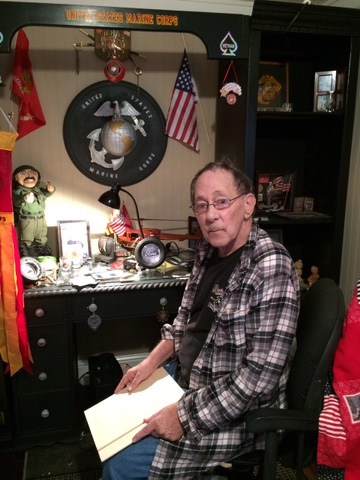Joe Phelps: One Marine's Story
In January of 1969, twenty-two year old Joe Robert Phelps, of Louisville, Kentucky received a letter from the United States government informing him that the U.S. military needed his assistance. He was one of many to receive draft notices that year. Young Joe showed up at the army recruitment station just as those fellows had taken a break. A large strapping guy next door invited Joe into his office for a cup of coffee while he waited. The man was a Marine. Before the day was over, so was Joe.

By the last week of January, Joe, and many like him, had been sworn in and sent to boot camp in Santiago, California. “We called ourselves the Hollywood Marines,” the now sixty-eight year old Marine says with a smile. In 1969, there was little to smile about. The country was in the throes of the Vietnam War.
After a three-month-long boot camp, Joe and a few other new recruits became part of a communications battalion, where they were trained to set up and operate field radios.
“We were just taught the basics,” Joe says, “We had fifteen days of strategy with pop-up targets on trails. By November, they were shipping us out.”
“Out” turned out to be Danang Airfield, just south of Hanoi in Vietnam. Joe remembers stepping off the plane and thinking, “Self, you ain’t in Kentucky anymore.”

Kentucky had always been home for Joe Phelps. One of four children born to Willard and Ruby Mae, the Phelps family lived in Butler County through Joe’s elementary school days then moved to Louisville in order to be closer to Willard’s work at Louisville Gas and Electric. Right out of high school, Joe joined his father at the plant and worked there until he was drafted in 1969.
The Phelps family was familiar with military service. Joe’s father served in the Navy during WWII, and his older brother joined the Navy, as well. When Joe told his dad he had joined the Marines, Willard responded, “What in the hell did you do that for!”
Joe thinks his father was as upset over the fact that he didn’t follow in the elder’s footsteps as anything. “I don’t have any regrets about joining the Marines,” Joe says.

As a Marine, Joe began his military path as part of the 1st Battalion, 26th Marine, 1st Division. Because he and others like him were trained in radio support, they could be utilized just about anywhere. As a result, when the 26th Marine unit was deactivated and sent back to the states, Joe and his buddies were attached to the 2nd Battalion, 5th Marine, 1st Marine Division, Hotel Company.
As part of the tactical air control party, Joe was in charge of any helicopters landing or taking off in Hill 10, his area. Joe used codes to let the medivacs know if they would be picking up civilians or soldiers and strobe lights or smoke canisters to direct the helicopters to safe landing sights.
“I guess, the first time I saw our guys get wounded kind of changed my attitude toward Vietnam,” Joe says.
The attack came at night. They had been warned the day before that the attack was coming, but the warning was given by an NVA (North Vietnam Army) colonel, who had surrendered to the Americans, and the threat wasn’t taken seriously. Joe looks back on that attack as a preventable tragedy. The NVA colonel said the plan was to bombard the enemy with rockets and mortars for two straight nights then over-run the camp on the third night and plant the NVA flag. There was no attempt by the Americans to see if the claim had any legitimacy. Just as predicted, the camp was stuck by rocket and mortar fire. There were eleven U.S. casualties. It was Joe who had the job of directing the medivac helicopters into the area to pick up the wounded and dead.
It is no wonder to anyone that many of the soldiers who fought in Vietnam still suffer from PTSD (Post Traumatic Stress Syndrome). Joe Phelps was among their number. He returned home to Louisville in 1971, a changed man. When the nightmares began to plague him, Joe sought help at a veteran’s center in the area, where he was diagnosed. In 1988, he was allowed 10% disability. It wasn’t until he was sixty-two years old that he, with the help of legal assistance, received 100% disability from the military.

These days, Joe Phelps spends much of his time in the woodworking shop behind his house. He and wife, Cathy, moved back to Butler County in 1993. Joe first bought a mitre saw and has added to his shop tools as the need arises. Woodworking has been good therapy, Joe says. You can see evidence of his creativity throughout the lovely country home, where he and his wife of twenty-three years now live.
Joe still stays in touch with a few of his old military buddies, as well as his brother, who currently lives in Norfolk, Virginia. In his home, Joe has one room dedicated to the Marines and his military experience. There are a couple of clocks Joe made himself, a quilt his wife had made for him, an American flag, and front and center, a large United States Marine Corps emblem.
“I have to believe everything works out for a reason,” Joe says.
If you are to survive Vietnam, it’s probably the only way you can look at it.

By Cheryl Hughes, Beech Tree News
- Log in to post comments































